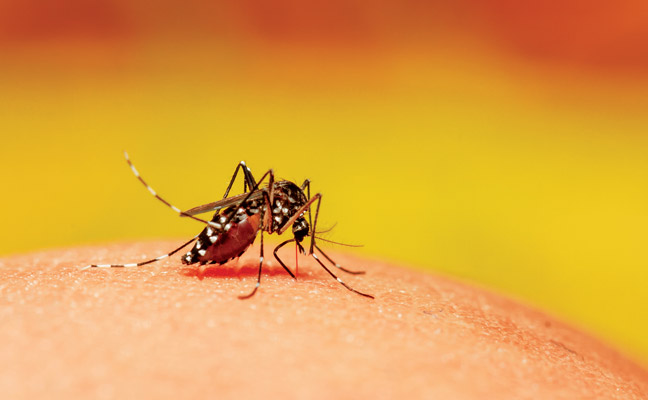
Aedes aegypti is a known carrier of dengue fever, Zika virus, and other illnesses. PHOTO: LOVESILHOUETTE/ISTOCK / GETTY IMAGES PLUS/GETTY IMAGES
Have you given much thought to the family history of the yellow fever mosquito (Aedes aegypti)? Researchers at the University of Florida Institute of Food and Agricultural Sciences (UF/IFAS), Vero Beach, Fla., have — and as a result, have found a link between healthy mosquito fathers and their healthy offspring.
“There are greater than 3,000 mosquito species around the world, and they are the most dangerous animal on the planet,” Dr. Barry Alto, a UF/IFAS associate professor of entomology at the Florida Medical Entomology Laboratory and a co-author on the study, said in a news release. “The reason is because they cause human illnesses and deaths attributable to the pathogens they transmit ranging from malaria and filarial parasites to viruses.”
“Paternal and maternal effects in a mosquito: A bridge for life history in transition” was published in the Journal of Insect Physiology. For the study, Dr. Alto and doctoral graduate Kylie Zirbel Yanchula sought to determine whether the “quality of the mosquito mate influences reproductive allocation of resources such as macronutrients (lipids and proteins) to their offspring.”
The pair used a model system of a mosquito, breaking down the relative importance of the health of the mosquito mother and father had on offspring. They used the offspring of mosquitoes collected in 2012 from the Florida Keys to establish a lab-based colony, where mosquitoes were raised in low- and high-quality nutrient environments. From these two groups, adult male and female mosquitoes were paired for mating to produce offspring for the experiment.
Dr. Alto said the study found that the quality of a parental larval diet results in a different allocation of resources in offspring, depending on the nutritional condition of the father.
“Maternal effects mostly influenced the number of eggs produced by females, as well as their lipid investment of the eggs,” he said, explaining that the amount of nutrients in the eggs represents the female investment, which ultimately can influence offspring health and development.
Female mosquitoes that mated with males who were fed high-quality diets, invested higher amounts of nutrients to their offspring. As the news release explains, “lipids are a source of energy for the mosquito larvae. Lipids can be a determining factor to the offspring’s survival. Studies on the biology of mosquitoes yield insights into strategies to exploit mosquito biology for purposes of controlling mosquitoes and the pathogens they transmit.”
“Through a series of experimental tests that involved nutritional treatments to determine whether mate quality directly influences reproductive allocation by mosquito mothers, we demonstrate that when low-quality female mosquitos mate with high-quality males, they invest higher amounts of lipid nutrients, to their offspring,” Dr. Alto said in the news release.
The next step, Dr. Alto said, will be to see how this affects the hormone levels of female mosquitoes, as it is closely linked to reproduction rates.
Leave A Comment